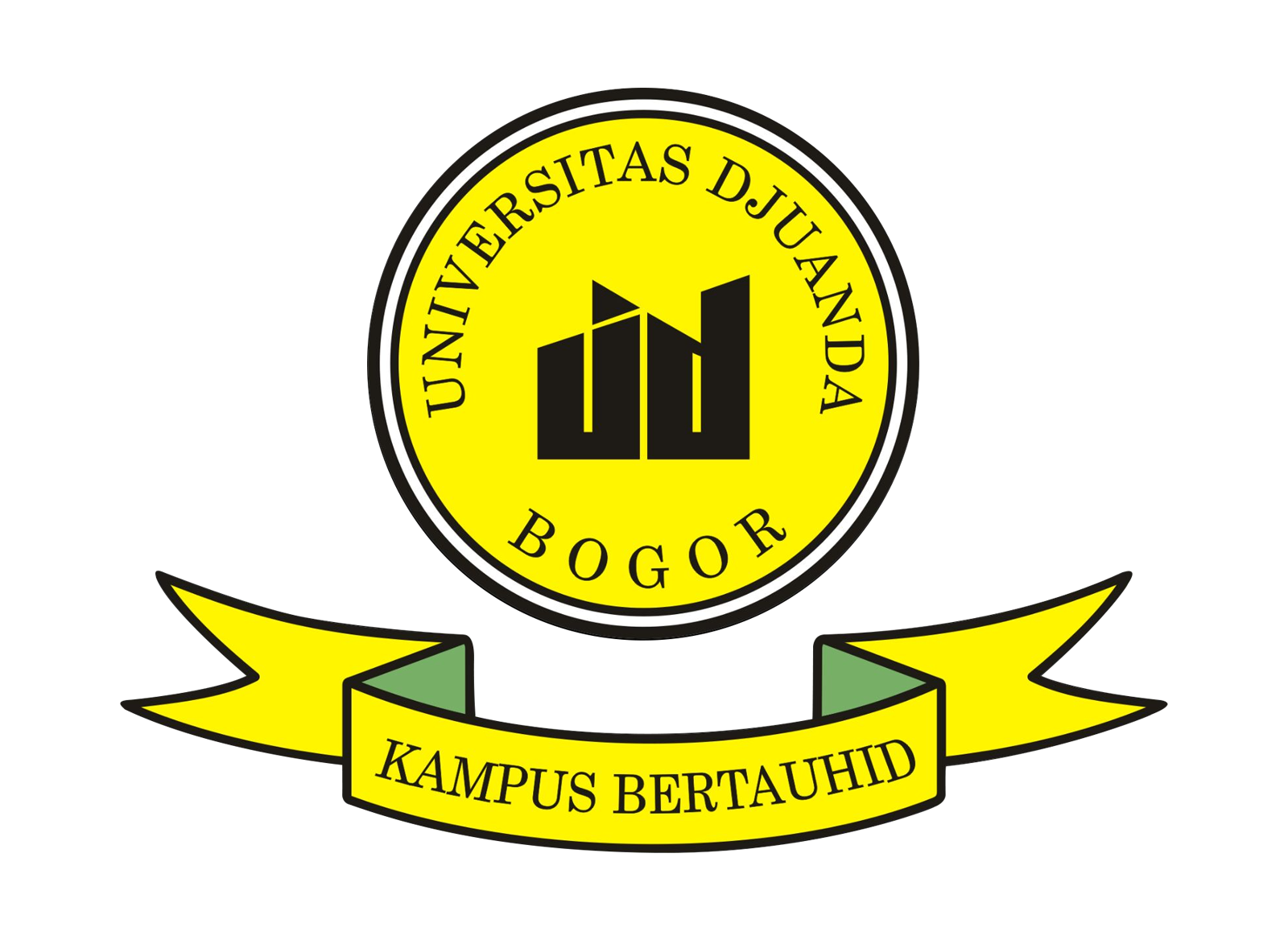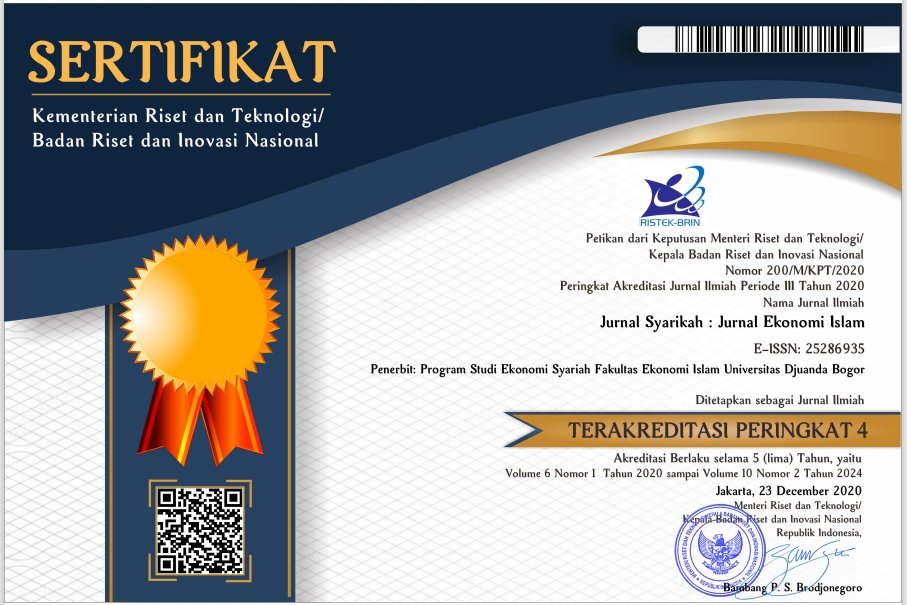ANALISIS POTENSI PENERBITAN SUKUK DAERAH DALAM PEMBIAYAAN GREEN INFRASTRUCTURE DI DKI JAKARTA
DOI:
https://doi.org/10.30997/jsei.v9i1.8511Keywords:
APBD, Infrastruktur Hijau, Sukuk daerah, SDGsAbstract
Tantangan terbesar dalam pembangunan infrastruktur di suatu daerah adalah mengenai anggaran pendapatan belanja daerah yang harus dengan efektif dan efisien dikelola oleh pemerintah daerah. Ketimpangan infrastruktur yang ada di Indonesia menjadi permasalahan penting untuk diatasi. Ini menjadi salah satu tantangan dalam pengembangan instrumen keuangan Islam terutama pembiayaan infrastruktur daerah yaitu tantangan pemerataan pembangunan di Indonesia tanpa mengandalkan APBD. Saat ini Indonesia belum ada yang menerbitkan sukuk daerah walaupun secara landasan hukum sudah ada, sehingga menjadi tantangan dan potensi peluang agar bisa menerbitkan sukuk daerah. Penelitian ini mencoba menganalisis strategi penerbitan sukuk daerah dengan mengedepankan aspek green economy, dan yang menjadi tujuan adalah pembangunan green infrastructure. Metode penelitian yang digunakan adalah kualitatif menggunakan alat analisis SWOT (Strength-Weakness-Opportunity-Threat) dengan matriks interaksi EFAS-IFAS. Dari penelitian ini ditemukan strategi Kelemahan-Peluang (WO) adalah strategi paling tepat, yaitu membuat peraturan turunan dari POJK Nomor 63/POJK.04/2017 Tahun 2017 tentang pengaturan: SDM, pelaporan keuangan, wewenang underlying aset, dan prosedur dalam aspek pemasaran kepada masyarakat agar tidak terbentur dengan sukuk yang diterbitkan oleh pemerintah pusat.
References
Abidin, M. (2016). Analisis Investasi Dana Haji dalam Pembiayaan Infrastruktur dan Peningkatan Kualitas Penyelenggaraan Ibadah Haji. Harmoni, 152–164.
Abrorov, S. (2020). The importance of sukuk in the development of economy: As an example of its impact on the income of the Malaysian population. Journal of Critical Reviews, 7(2), 776–780. https://doi.org/10.31838/jcr.07.02.142
Ahmed, H. (2019). Fiscal policy and deficit financing: Islamic perspectives. Journal of King Abdulaziz University, Islamic Economics, 32(1), 79–85. https://doi.org/10.4197/Islec.32-1.5
Aladdin, A. A., Gordienko, M., Nekrasova, V., & Javid, A. F. (2020). Fiscal potential of the investment mechanism of Islamic finance. E3S Web of Conferences, 220, 1–5. https://doi.org/10.1051/e3sconf/202022001012
Amornsiripanitch, N. (2022). The real effects of municipal bond insurance market disruptions 1. Journal of Corporate Finance, 75(April), 102240. https://doi.org/10.1016/j.jcorpfin.2022.102240
Aziz, S., Ashraf, D., & El-Khatib, R. (2021). Societal trust and Sukuk activity. Journal of International Financial Markets, Institutions and Money, 74(July), 101384. https://doi.org/10.1016/j.intfin.2021.101384
Bhuiyan, R. A., Rahman, M. P., Saiti, B., & Mat Ghani, G. (2019). Co-movement dynamics between global sukuk and bond markets: New insights from a wavelet analysis. International Journal of Emerging Markets, 14(4), 550–581. https://doi.org/10.1108/IJOEM-12-2017-0521
Campisi, D., Gitto, S., & Morea, D. (2018). Shari’ah-compliant finance: A possible novel paradigm for green economy investments in Italy. Sustainability (Switzerland), 10(11), 1–12. https://doi.org/10.3390/su10113915
Cornaggia, K., Hund, J., & Nguyen, G. (2022). Investor attention and municipal bond returns. Journal of Financial Markets, September 2021, 100738. https://doi.org/10.1016/j.finmar.2022.100738
Cuny, C. (2018). When knowledge is power: Evidence from the municipal bond market. Journal of Accounting and Economics, 65(1), 109–128. https://doi.org/10.1016/j.jacceco.2017.11.002
Darus, F., Ahmad Shukri, N. H., Yusoff, H., Ramli, A., Mohamed Zain, M., & Abu Bakar, N. A. (2017). Empowering social responsibility of Islamic organizations through Waqf. Research in International Business and Finance, 42(May), 959–965. https://doi.org/10.1016/j.ribaf.2017.07.030
Harimurti, A. J., Zaky, A., & Brawijaya, U. (2011). OBSTACLES AND STRATEGY OF MUNICIPAL ISLAMIC BONDS ISSUANCE AS OBSTACLES AND STRATEGY OF MUNICIPAL ISLAMIC BONDS ISSUANCE AS AN ALTERNATIVE OF MUNICIPAL FUNDING. 33, 1–14.
Ibrahim, A. J., & Shirazi, N. S. (2020). The role of islamic finance in fostering circular business investments: The case of oic countries. Journal of Economic Cooperation and Development, 41(1), 89–120.
Keshminder, J. S., Abdullah, M. S., & Mardi, M. (2022). Sukuk daerah– Malaysia surviving the bumpy road: performance, challenges and reconciled issuance framework. Qualitative Research in Financial Markets, 14(1), 76–94. https://doi.org/10.1108/QRFM-04-2021-0049
Khoshnava, S. M., Rostami, R., Zin, R. M., Kamyab, H., Abd Majid, M. Z., Yousefpour, A., & Mardani, A. (2020). Green efforts to link the economy and infrastructure strategies in the context of sustainable development. Energy, 193, 116759. https://doi.org/10.1016/j.energy.2019.116759
Laila, N., Rusmita, S. A., Cahyono, E. F., & Azman-Saini, W. N. W. (2021). The role of financial factors and non-financial factors on corporate bond and sukuk rating Indonesia. Journal of Islamic Accounting and Business Research, 12(8), 1077–1104. https://doi.org/10.1108/JIABR-10-2019-0187
Mawardi, I., Widiastuti, T., & Al Mustofa, M. U. (2022). Constraints and strategies for municipal Sukuk issuance in Indonesia. Journal of Islamic Accounting and Business Research, 13(3), 464–485. https://doi.org/10.1108/JIABR-03-2021-0082
Muharam, H., Anwar, R. J., & Robiyanto, R. (2019). Islamic stock market and sukuk market development, economic growth, and trade openness (The case of Indonesia and Malaysia). Business: Theory and Practice, 20(2014), 196–207. https://doi.org/10.3846/BTP.2019.19
Odusami, B. O., & Mansur, I. (2022). Economic Fundamentals, Policy Responses, and State-Level Municipal Bond Sensitivity to COVID-19 Prevalence. North American Journal of Economics and Finance, 61(November 2021), 101693. https://doi.org/10.1016/j.najef.2022.101693
Richardson, E. (2019). Responsible finance sukuk - Can they bring societal value to a value-neutral market? Capital Markets Law Journal, 14(3), 394–428. https://doi.org/10.1093/cmlj/kmz011
Santoso, I. R. (2020). Sukuk daerahand sustainable economic development goals: Mitigating climate change in Indonesia. Global Journal Al-Thaqafah, 10(1), 18–26.
Smaoui, H., Mimouni, K., & Temimi, A. (2020). The impact of Sukuk on the insolvency risk of conventional and Islamic banks. Applied Economics, 52(8), 806–824. https://doi.org/10.1080/00036846.2019.1646406
Wang, Z. J., & Yang, J. (2021). Cross-trading and liquidity management: Evidence from municipal bond funds. Pacific Basin Finance Journal, 67(November 2020), 101564. https://doi.org/10.1016/j.pacfin.2021.101564
Downloads
Published
How to Cite
Issue
Section
License
Copyright (c) 2023 Jurnal Syarikah : Jurnal Ekonomi Islam

This work is licensed under a Creative Commons Attribution-ShareAlike 4.0 International License.
Authors who publish with Jurnal Syarikah: Jurnal Ekonomi Islam agree to the following terms:
- Authors retain copyright and grant the journal right of first publication with the work simultaneously licensed under a Creative Commons Attribution 4.0 International License that allows others to share the work with an acknowledgement of the work's authorship and initial publication in Jurnal Syarikah: Jurnal Ekonomi Islam.
- Authors are able to enter into separate, additional contractual arrangements for the non-exclusive distribution of the journal's published version of the work (e.g., post it to an institutional repository or publish it in a book), with an acknowledgement of its initial publication in Jurnal Syarikah: Jurnal Ekonomi Islam.
- Authors are permitted and encouraged to post their work online (e.g., in institutional repositories or on their website) prior to and during the submission process, as it can lead to productive exchanges, as well as earlier and greater citation of published work
SURAT PERNYATAAN PEMINDAHAN HAK CIPTA[1]
Yang bertanda tangan di bawah ini adalah penulis naskah yang berjudul:
yang diajukan untuk dipublikasikan pada Jurnal Syarikah : Jurnal Ekonomi Islam ISSN 2442-4420 menyatakan bahwa:
Kami bersedia memindahkan hak publikasi, distribusi, reproduksi, dan menjual naskah kamiyang berjudul tersebut di atas sebagai bagian dari Jurnal Syarikah kepada Dewan Redaksi Jurnal Syarikah : Jurnal Ekonomi Islam ISSN 2442-4420
Demikian surat pernyataan ini saya buat dengan sadar, penuh rasa tanggung jawab, dan tanpa paksaan dari pihak mana pun!
No | Nama Penulis (lengkap dengan gelar akademik) | Nama dan Alamat Institusi, email | Tanda Tangan | Tanggal |
1 |
|
|
|
|
2 |
|
|
|
|
3 |
|
|
|
|
4 |
|
|
|
|
5 |
|
|
|
|
[1] Dikirim ke Dewan Redaksi Jurnal Syarikah, Program Studi Ekonomi Islam Fakultas Ekonomi Islam Universitas Djuanda Bogor, Gedung B Lantai IV Jl Tol Ciawi No. 1 Kotak Pos 35 Ciawi Bogor 16720, difaksimilikan ke 02518240985, dan hasil scanning-nya diemailkan ke Jurnal.Syarikah@unida.ac.id


